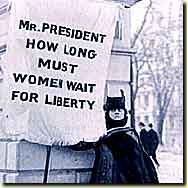Alice Paul displayed many qualities of leadership. Paul possessed a clear and vibrant vision of her goals for equality. Through her actions, she was able to share this vision to others and act upon it. As a communicator, she was able to clearly express her vision to both her followers and resisters. Paul did this through a variety of ways, including marches in Washington D.C and silent protests on the White House. Paul had the ability to direct her actions, successfully, towards her goal. Nothing stopped or delayed her pursuit. Lastly, Paul was dedicated to her cause. She spent a lifetime of energy to accomplish her goal. She never married nor had children, which was the main goal of many women in her time. Paul was willing to do whatever it took, including being jailed and abused, in order to see that the 19th Amendment was passed and that women would have the right to vote.
The main turning point in Alice Paul’s life was when she realized that her position on equal rights was not the same as the National American Women’s Suffrage Association (NAWSA). It was a very courageous and bold move for her to form a brand new party, the National Women’s Party (NWP). By forming this new group of suffragists, she actually was working against people who she previously supported. This could have and did weaken her actions for a short while. Paul had the ability to recognize that a momentary shortfall would be the correct consequence for a future gain.
Alice Paul spent years working towards gaining the right to vote for women. Her efforts were ignored and ridiculed by many politicians, including the President. This repeated failure, served as a source of fuel for her cause. Each time she was denied, jailed or even abused, Paul fought harder. She constantly searched and discovered new ways for supporting and implementing her cause. Her dedication and commitment were astounding. The tireless efforts of one woman continue to have a direct impact on a nation, almost 100 years later.
Hakala, D. (2008). The Top 10 Leadership Qualities. Retrieved from
